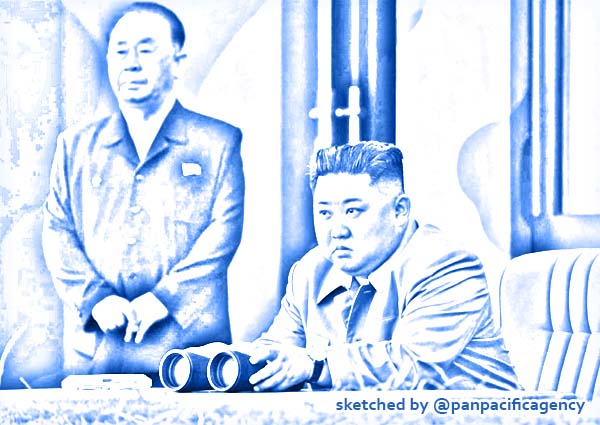North Korea fired new guided weapon as warning against South: state media

Photo courtesy of Korea Media. Sketched by the Pan Pacific Agency.
PYONGYANG, Jul 26, 2019, Kyodo. North Korean leader Kim Jong Un oversaw the “demonstration” firing of a “new-type tactical guided weapon” on Thursday to send a warning to South Korea against holding a joint military drill with the United States next month, state-run media reported Friday according to the Kyodo.
The report came after Pyongyang fired two missiles from its east coast into the Sea of Japan on Thursday morning that Seoul says were a new type of short-range ballistic missile that flew about 600 kilometers.
The test was aimed at sending a “solemn warning to the south Korean military warmongers who are running high fever in their moves to introduce the ultramodern offensive weapons into south Korea and hold military exercise,” the Korean Central News Agency said.
North Korea has long called on the United States and South Korea to halt joint military drills, which Pyongyang regards as rehearsals for invasion.
Seoul should stop “suicidal” acts such as the introduction of ultramodern weapons and military exercises, Kim was quoted as saying by the news agency.
The report said the missile’s specific features of the “low-altitude gliding and leaping flight orbit” would make it hard to intercept, and characterized the guided weapon system as that which to be “newly deployed for operation.”
Kim said North Korea’s “development and possession of such state-of-the-art weaponry system is of huge eventful significance in developing our armed forces and guaranteeing the security of the country by military force,” according to KCNA.
The news agency also quoted Kim as saying, “We cannot but develop nonstop super powerful weapon systems to remove the potential and direct threats to the security of our country that exist in the south.”
North Korea recently said that it may reconsider its suspension of nuclear and intercontinental ballistic missile tests if the United States and the South go ahead with joint drills as planned in August.
Thursday’s missile launch was the first by North Korea since Kim and U.S. President Donald Trump agreed at their June 30 meeting at the inter-Korean truce village of Panmunjeom that the two nations would resume stalled denuclearization talks within weeks.
Friday’s KCNA report did not refer to Trump or the United States.
The United States urged North Korea on Thursday to refrain from further provocations, with State Department spokeswoman Morgan Ortagus expressing hope that the two sides will promote negotiations to address Pyongyang’s nuclear and missile programs.
Some foreign affairs experts, however, say that the latest missile test-firing will make it more difficult for the United States and North Korea to restart denuclearization talks soon.
Speculation had grown that North Korean Foreign Minister Ri Yong Ho and U.S. Secretary of State Mike Pompeo might hold direct talks on the sidelines of this year’s ASEAN Regional Forum in Bangkok on Aug. 2, but according to news reports, Ri has cancelled his attendance.
The annual regional security gathering, centered on the 10-member Association of Southeast Asian Nations, is one of the very few multilateral events attended by North Korea, which has sent its foreign minister almost every year.
In early May, North Korea fired what resembled Russian Iskander surface-to-surface, short-range ballistic missiles on two occasions. The missiles tested then are called KN-23.
The two missiles launched Thursday were likely either KN-23 or a modified version. A source within South Korea’s Joint Chiefs of Staff said Friday that both flew about 600 km, retracting its initial assessment that the first one flew about 430 km and the second around 690 km.
The distance traveled by the missiles indicates they may be capable of reaching the whole of South Korea and parts of Japan.
Friday’s edition of the Rodong Sinmun, the mouthpiece of the ruling Workers’ Party of Korea, ran photos of a missile fired from a mobile launcher and of Kim observing the scene.
U.N. Security Council resolutions have banned North Korea from using ballistic missile technology.